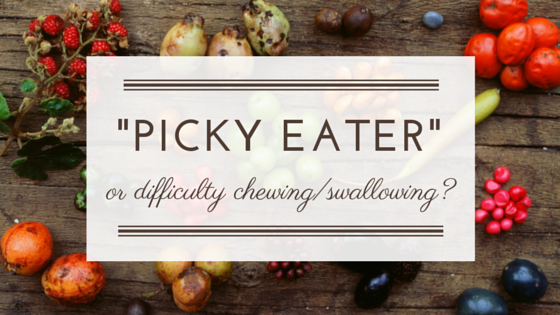
Most children go through a "picky eater" phase. Becoming more selective about what foods they will eat is a normal stage in child development. Most kids will move through this phase and gradually widen their food repertoire. It may be normal, but it can make mealtimes stressful!
Sometimes, though, it is more than a normal phase. It can be a feeding problem. For some kids, the problem can be sensory based. For others, it can be a fear stemming from a past near-choking incident (or time they felt "unsafe" eating something). There can be a behavioral or medical component.
For some children, there is an underlying physical problem. When there is an underlying physical issue, feeding and swallowing disorders are collectively called "Dysphagia". These kids typically require intervention from feeding specialists. They will not just "out-grow' it and may develop serious health problems if not appropriately managed; for example they are not able to meet their nutrition needs or may aspirate food/liquid into the lungs. Feeding and swallowing problems can affect individuals from newborn through adulthood. Did you know that speech-language pathologists (SLPs) diagnose and treat feeding problems? In addition to the SLP, the feeding team can include the doctor, a registered dietician, occupational therapist (OT) and others. If you have concerns, trust your gut and seek the advice of a qualified feeding specialist (note that not all SLPs/OTs specialize in feeding/swallowing disorders). You can find additional resources and search for professionals in your area on the Pediatric Feeding Association website. You can also search for a certified SLP in your area via the ASHA website.
If you have a "picky eater", "problem eater", or just want to read more about encouraging a wide variety of foods in your child's diet, here are a few books you might be interested in reading [affiliate links]:
- From Picky to Powerful: Transform Your Outlook on Picky Eating and End Food Battles Forever!
- Food Chaining: The Proven 6-Step Plan to Stop Picky Eating, Solve Feeding Problems, and Expand Your Childs Diet
- Happy Mealtimes with Happy Kids: How to Teach Your Child About the Joy of Food!
- (available for preorder) Happy Mealtimes with Happy Kids: How to Teach Your Child About the Joy of Food!
Here are a few websites that may also be useful:
Do you have any other books or resources you would add??
Disclosure: This post contains affiliate links for your convenience.